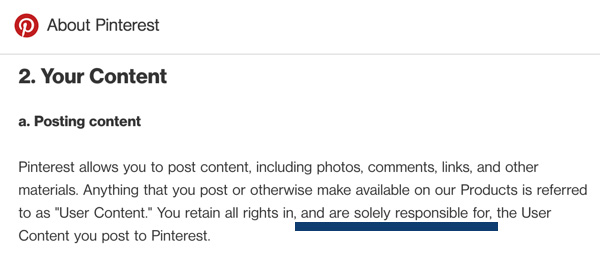
Before we start getting into the nitty gritty of this
article, we’ll start by saying that Sales & Marketing Technologies is not a
law office and can’t give you legal advice. However, here a few
things you might want to know to keep yourself out of hot water.
Many businesses these days are taking up social media
marketing on their own.
While it’s very important to have your business on the
social channels that make sense for your industry and particular business, it’s
also important to make sure you’re doing it correctly.
If you’re sharing images that you did not create on social
media, it is important to understand a few things about what is considered
copyright infringement.
#1 Know Copyright
Basics
You don’t need to have extensive law knowledge to know a few
copyright basics – and those basics can really go a long way in protecting your
business (and protecting your own content).
Here are some key
points:
- Copyright is a designation given to creative works that you
put into the world in a “fixed form,” meaning as soon as you publish that blog
post or photo, it’s protected.
- Copyright covers a variety of categories including literary
works (books, poetry, articles); performing arts (music, lyrics); visual arts
(artwork, jewelry, photos); digital content (websites, blogs); motion pictures
(movies, television, videos); and photographs (commercial, personal, portrait).
- Copyright protection is automatic, meaning the work is
presumed to be yours. Many people still use the copyright symbol © as a way of
stating their claim, even though it’s not required.
- With this copyright protection, you get certain rights. For
example, no one else can use your work without permission.
- If you want the ability to sue for copyright infringement
(if someone steals your work), you need to register the work with the U.S. Copyright Office within
90 days of publication.
An easy way to think about copyright protection is: If you
didn’t create it, you may not be able to use it (even if you give credit to the
original creator).
#2 Read the Terms for
the Social Media Platforms
Different social media platforms have different rules.
Even if sharing something on Twitter is fine, it might not
be on Pinterest. To know what is or isn’t acceptable for each platform,
you’ll have to read each platform’s Terms of Service/Use/Conditions.
For example, let’s take a look at Pinterest.
On Pinterest, you’re allowed to repin other images on
Pinterest (meaning, you can’t copy to another platform). However, if the image
you’re repinning appears on Pinterest without permission from the author, you
could be committing copyright infringement because you’re “solely responsible”
for anything you post.

Here’s what that would look like:
Jen takes an amazing photo of a rug she made and posts it on
her blog. Sara loves the photo and decides to post the photo on her Pinterest
account with the instructions on how to make it. Penelope then repins Sara’s
post on her board of craft ideas. Both Sara AND Penelope may be liable to Jen
for copyright infringement, even if Penelope had no idea that it was originally
shared without consent.
The takeaway on this example is that you should always check
the sources of the original pin to ensure the author and photo are on
Pinterest.
But not all platforms are like Pinterest in this aspect, so
take the time to read the terms for each platform your business is going to be
on to save yourself a lot of trouble, time and money in the future.
#3 Get Permission
If you’re not sure whether or not it’s ok to use an image or
video online, ask!
Take Instagram for example. Reposting an image is actually
in violation of Instagram’s Terms… but (and it’s a big but) 99% of users are
okay with you reposting if you ask and give proper credit with a link back to
their profile.
“Better safe than sorry” is a great motto when thinking
about whether you’re using images and videos legally.
If a photographer or attorney catches you using an image
illegally, you can’t claim ignorance and you would be on the hook for damages.
#4 Choose the Right
License for Stock Photos
Just because you pay for a stock image doesn’t mean you can
use it however you want. Often when paying for stock images you have choices
for what type of license you can have. Generally, the more expensive the
license, the more you’re allowed to use it for.
Some licenses are for personal use only, online media only
(not print), or for a certain number of uses.
To make sure you’re using the image legally, look for
license guidelines in the footer of the website where you purchased the image.
Or you can always reach out and ask the company if your license permits your
intended use of a picture.
#5 Don’t Assume Fair
Use
The Fair Use doctrine was created to allow for certain use
of images and content as long as that use doesn’t impede the author’s rights.
However, a lot of people misuse this.
Typically, fair use applies to comment, criticism or parody.
Fair use is about how someone is using content and can be a
grey area. Courts use a four-factor test to
determine whether fair use is in play:
- The purpose and character of the use (whether it’s for
commercial or nonprofit/education purposes). The more on the side of education,
the more likely it’s fair use.
- The nature of the work.
- The amount of the work used compared to the whole work (meaning,
was it a paragraph from a book or was it the entire book?).
- Effect on the market or value of the work.
An example of fair use would be using a snapshot of Mark
Cuban in a webinar you’re hosting about entrepreneurs following their dreams.
You can’t share an entire interview from him from a TV station, claiming
education and fair use.
Fair use is a balance in copyright protection and public
interest.
Conclusion
Using images that you did not create for your social media
marketing can be tricky. Whether you’re posting to your Facebook page,
repinning from your Pinterest account, or looking to repost an image on
Instagram, you have to be careful you’re going about it legally.
If you keep these tips in mind as you use images on social
media, you should be ahead of the curve and in a much better position to
protect your business.
If you’re looking to get started in social media marketing,
it’s often helpful to have a partner who not only can help you navigate what is
ok to post, but what can help your business grow!
To learn more about social media and how it can help your
business, call Sales & Marketing Technologies today at (407) 682-2222 for a
free strategy call with one of our expert social media marketers.